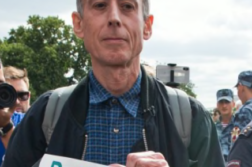“WE’RE left outside Ukrainian politics,” lesbian activist Natalia Nahorna told me in an interview. “People are not tolerant to minorities here. It will take years to change.” Nahorna has done research on lesbian life in Ukraine and organized the country’s 2003 pride parade. In the same Independence Square where the Orange opposition successfully overturned Ukraine’s fraudulent election in late 2004, counter-demonstrators waved banners a year earlier with such slogans as “Deviants get out of Ukraine” and “Homiki are the reason for AIDS” (homiki, hamsters, is a slur for homosexuals).
Gay activist Vladislav Topchev echoed Nahorna’s pessimism. “The presentation of us in the media is to satisfy heterosexual interest. Even if journalists are gay-friendly, information tends to be distorted.” He has heard about physical attacks everywhere in Ukraine. Homophobia is rampant both in the industrial, largely Russian-speaking east, and in the Europe-turning, Catholic west, he told me. “There is no difference in the level of homophobia.”
Ukraine is one of Europe’s largest countries: it has great potential—fertile soil, a mild climate, and massive mineral riches. And yet, the economy has been deteriorating. The environment was badly damaged by the 1986 Chernobyl nuclear disaster—this on top of pollution, deforestation, and heavy industry’s waste. The infrastructure is in disrepair, as is everyday life in the Soviet-style apartment blocks and the dangerous streets. The country is plagued by corruption and organized crime. Moreover, Ukraine is very badly affected by the hiv/aids crisis. According to the World Bank, Ukraine and Russia are the two countries where AIDS growth is fastest.
Ukraine is split in several ways. As in other East European countries, economic divisions are rampant: there is a brutal divide between the super-rich oligarchs, who control eastern Ukrainian industry, and the disenfranchised masses throughout the country. The economic gap continues between men and women, supporting a sexism that’s taken as the natural order. Even the matriarchs, the babushkas who enable Ukrainian families to survive, support the patriarchy. Feminist scholar Natalia Monakhova commented that women entering the public sphere in Ukraine uphold the division of society along gender lines and subordinate their needs to the seemingly gender-neutral “primary needs” of the nation: “Women are unnoticed in Ukrainian politics.”
The defeat of Viktor Yanukovich, the self-proclaimed winner of Ukraine’s fraud-ridden presidential election in November 2004, is seen as a hopeful sign. Viktor Yushchenko, who won the re-vote on December 26, 2004, is viewed by the West as the “liberal” alternative. Nevertheless, neither Yanukovich nor Yushchenko has expressed any concern about the situation of women and gays in Ukraine. Now the country has become the darling of the European Union, but consider the fact that Poland, which colonized Ukraine for centuries and now belongs to the EU, eagerly supports Yushchenko as a soul-mate. Rightist, homophobic Polish politicians are leaders in voicing that support. Jaroslaw Kaczynski, who heads the ultra-right Law and Justice Party—which banned a gay parade in Warsaw and calls gays “deviants”—visited Kiev and gave an address in Independence Square. A closeted gay man—outed by the homophobic Lech Walesa, Poland’s then-president, who publicly referred to Kaczynski and “his husband”—Kaczynski is anti-gay, anti-abortion, anti-secular, pro-capital punishment, and pro-Yushchenko.
After the fall of Communism and Ukraine’s independence from Russia in 1991, homosexuality remained unmentionable in Ukraine. Vladislav Topchev told me how difficult it has been to pass an employment anti-discrimination bill that includes sexual orientation. The words “sexual orientation” had to be dropped from the bill during parliamentary debates. Although the phrase has been reinstated, it’s now too late for the bill to be taken up. “Xenophobia and homophobia go hand in hand in Ukraine,” Topchev observed. “Both gays and women are seen as inferior. There is psychological degradation of them in Ukraine.” Topchev is an aeronautical engineering student, but plans to major in psychology in order to analyze and fight homophobia. The victory of the Orange opposition, he believes, will make Ukrainian politics more civilized. Publicly, the opposition doesn’t touch the issue of homosexuality, but privately gays know that they have supporters among opposition politicians.
The emergence of the GLBT movement in Ukraine has been difficult and delicate. The Orthodox Church, dominant in eastern Ukraine, has an ambiguous attitude toward homosexuality. In the western Ukraine, the Vatican-controlled and conservative Ukrainian Catholic Church is dominant, with all the attendant attitudes toward homosexuality. These attitudes have secular as well as religious traditions. Under Communism, homosexuality was severely penalized: gay men were sent to labor camps and gulags, while lesbians were confined to mental hospitals. Homosexuality was decriminalized in the post-communist Ukraine in 1991, but popular homophobia is rising.
THIS situation exists despite the undeniable strength of gay culture and history. Homosexuality is prominent, albeit understated or silenced, in Ukrainian literature. National philosopher and poet Hrihoriy Skovoroda (1722–1794) walked across Ukraine with a group of his male disciples. His philosophical concerns and his homoeroticism remind us of Socrates, and he authored Socratic dialogues—A Conversation among Five Travelers Concerning Life’s Happiness and Narcissu, or a Dialog About Knowing Thyself—that championed freedom and denounced tyranny.
One writer whose lesbian texts are being discovered is Lesya Ukrayinka (1871–1913), who traveled to Italy, Egypt, and the Caucasus in search of a cure for tuberculosis. Eventually becoming bed-ridden, she authored lyric and epic poetry and dramas. The critic Svetlana Saliy has analyzed Ukrayinka’s autobiography, poetry, and her last letter from Egypt to her woman lover. Cryptically, punningly, and bilingually, Ukrayinka asked “Who are they still, who are they that belong together? Who is it that loves, who is it that is loved? Who?”
Author of The Inspector General, The Overcoat, and Dead Souls, Nikolai Gogol (1809-1852) was born in Sorochintsy near Poltava, now in Ukraine. Gogol’s childhood with Cossacks, serfs, and folk demons re-emerged in his writings. Conservative literary criticism regarded Gogol as asexual, but in The Sexual Labyrinth of Nikolai Gogol, Berkeley scholar Simon Karlinsky demonstrated Gogol’s homosexuality. Another writer viewed by traditionalists as asexual, Polish romantic poet Juliusz Slowacki (1892–1941), was born and bred in Ukraine. He was a dandy who, while in exile in France and Switzerland, wrote poems of narcissism and national tragedies inhabited by Byronic youths. His dramas depict the Cossack sexual transgressor Ivan Mazeppa, about whom both Gericault and Byron enthused. A museum in Slowacki’s honor operates today in his Ukrainian birthplace—without mention of his literature’s eroticism. Outstanding Russian poet Marina Tsvetaeva (1892–1941) eloped to Ukraine with her lesbian lover. Tsvetaeva’s work is undergoing a revival in Eastern Europe and in the West due to the efforts of feminist theorist Helene Cixous. But in Ukraine the curtain remains drawn: homosexuality is banished from general discussion.
The Gay Ukrainian International website says this: “Describing Ukrainian gay issues, we should emphasize that coming out still is impossible and absolutely unrealistic here. Homosexuality still is considered as shameful and undesirable, so a majority of Ukrainian gay men try to withhold this aspect of their lives. Actually, it is traditional for all Ukrainians to keep their private life a secret. Since Soviet times our people associate private life with sexuality and feel great shame just thinking that their privacy could be exposed.”
“We were campaigning for an anti-discrimination law, but with the instability now, we need to wait,” observed Vladislav Topchev. He hopes that the same political forces that brought about the new elections will bring more democracy and tolerance. Even though Ukraine decriminalized homosexuality nearly fifteen years ago, physical attacks are frequent. Last September, skinheads assaulted a gay pride demonstration in which Topchev participated. Media coverage is biased: “Even gay-friendly or gay journalists present us as not fully human,” he noted.
Lesbian activist Natasha Nagorna told me that there are private circles of people interested in the gay and lesbian tradition of culture. And there is the banya, the traditional steam bathhouse. Even Kiev motorcycle gangs relish their banya. Bathers flagellate each other with birch branches. Cruising, hustling, and sex (often unsafe) flourish in the banya. At home, Speedos and porn flicks on counterfeit DVDs are the favorite turn-on of Ukrainian gays.
Conjured by romantic writers, the Cossacks were rumored to enjoy homosexual sex in their all-male communities. But there’s a dark side to the history of the Cossacks: they were the perpetrators of pogroms. Anti-Semitism has been rekindled time and again in Ukrainian history. The Cossacks of Bohdan Khmelnytsky (Chmielnicki) led pogroms: from 1648 to 1649, between 65,000 and 100,000 Jews were killed. It was in Ukraine that Hassidism emerged. In 1941 some 34,000 Jews were massacred by the Nazis on the northern outskirts of Kiev. Anti-Semitism is often mixed with homophobia in today’s Ukraine. According to Natalia Monakhova, the excluded groups in Ukraine are national and sexual minorities and women. Together with lesbian activist Natalia Nahorna, Natalia Monakhova presented a paper in which she argued, “Today Ukraine is engaged in a complicated process of active nation-making centered on the 19th-century peasant social values. As a result, a number of social groups and strata are excluded from the general national and social discourses, in particular from the political and decision-making spheres. They have found themselves marginalized within a seemingly new society.”
Ukrainian politics suffers from a majoritarian tone that excludes minority groups, especially gay people. Ukraine is in need of changes in its civil liberties culture and in its attitudes toward minorities. Natalia Nahorna told me that a mix of queer cultural tradition, current research, and emerging activism is creating—all too slowly—a new construction of homosexuality in Ukraine. But change is hard, she added, especially when “politicians fear that touching lesbian and gay rights will not win them popularity.”
I would like to acknowledge and thank Joe Lockard for help with English and Zbyszek Sypniewski for assistance in Ukraine.
Tomasz Kitlinski is a human rights activist living in Poland.




